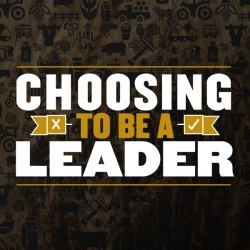Choosing to be a Leader
 There’s more to being a leader than setting a good example or making important decisions. Guidance from leaders is vital to the success of teams, and without guidance, teams can easily fall apart. So how do you become the best leader? The answer is simple — it’s a choice. A great leader chooses to become one. They are dedicated to leading in a way that is mindful of others, while driving performance and accountability. The change from a good leader to an exceptional one doesn’t happen overnight, but taking small steps can help you and those who follow you to thrive in everyday work environments.
There’s more to being a leader than setting a good example or making important decisions. Guidance from leaders is vital to the success of teams, and without guidance, teams can easily fall apart. So how do you become the best leader? The answer is simple — it’s a choice. A great leader chooses to become one. They are dedicated to leading in a way that is mindful of others, while driving performance and accountability. The change from a good leader to an exceptional one doesn’t happen overnight, but taking small steps can help you and those who follow you to thrive in everyday work environments.
Suzanne Peterson, associate professor of leadership at Arizona State University’s Thunderbird School of Global Management, recently shared insights with us on how leaders are cultivated. She highlights that excellence in leadership consists of routines and behaviors that can easily be taught. Throughout her career, Suzanne has consulted a variety of industry sectors, but spends a majority of her time advising on Wall Street and at other financial service firms. She will share her expertise at the 2019 ARA Management Academy, which is in partnership between Purdue’s Center for Food and Agricultural Business, Agricultural Retailers Association and Arizona State University.
Suzanne, you help organizations understand a High-Impact Leadership approach, which assumes that leadership is not a temperament but rather a choice, and leaders choose how to behave. Can you please overview the principles that are at the heart of a High-Impact Leadership approach?
Peterson: Leaders develop reputations mostly by what they do rather than who they are. This is because regardless of who a leader is on the inside, we only see the behavioral manifestation on the outside. Therefore, the leader must find the right behaviors that drive the reputation, style, or results they want regardless of their temperament. In the end, no one can make a leader engage in certain behaviors. It is a choice to do so; therefore, it’s a choice to be a great leader.
Most organizations today are very focused on developing talent as they believe and understand that people are key to driving results. If leadership is about making others better at what they do, can you expound on how the best leaders approach developing talent?
Peterson: Developing talent is at the heart of what makes the best leaders effective. They approach this by engaging in a variety of activities on a regular basis. To start, maintaining frequency of contact with their direct reports is vital. They don’t wait for regularly scheduled meetings or one-on-ones to connect. Rather, they connect as often as they can through a variety of media so that their dyadic relationships are rich and current.
They also give feedback on a regular basis. They don’t wait for pre-determined times — such as a performance review — to give positive or corrective feedback. Feedback should be a regular part of the leader/follower relationships and never something that either the leader or follower dread.
The best leaders understand the difference between feedback and coaching conversations. Real-time situations often require feedback. However, once a pattern of behavior is identified, a broader coaching conversation is needed. This type of conversation is characterized by leaders giving an explanation for why they would like to see some specific changes occur and how that change will impact the followers’ results, or even their career.
What is a piece of advice that you give organizations as they begin to make cultural shifts in leadership behavior?
Peterson: Don’t try to change too much at once. Make changes slowly so that they can become part of the organization and who you want to be as a leader. Pick one or two new behaviors that resonate with you and practice them for 6-8 weeks until they become second nature. In many ways, leadership is like doing exercise. It’s hard to make exercise part of your regular life if you only do it sporadically. Leaders must have the discipline to engage in one or two new behaviors every day for a certain period of time in order for them to become habitual.
Want to hear more from Suzanne? Register today for ARA Management Academy to dive deeper into leadership, communication and relationships with Suzanne. This program will run January 29–31, 2019, and will be held at Arizona State University. Contact Betty Jones-Bliss, bettyso@purdue.edu, for more information.
Tags: Agribusiness, ARA Management Academy, Business, Leaders, Leadership, Management, Strategy
RELATED POSTS:
Optimizing Sales Management: Knowledge, Coaching and Continuous Improvement
While we used to think that exceptional salespeople possessed an innate gift, recent data suggests the impact of today’s sales managers in nurturing and refining this gift to unlock its fullest potential.
A great moment for value-based sales in agribusiness
Value-based sales can empower companies to craft compelling value propositions, understand the customer’s business model and effectively communicate to stakeholders.
How can big data empower the development of new products?
Data is one of the most powerful resources for a company. It enables accurate decision-making and minimizes risk, ensuring greater revenue and sustainable growth.
